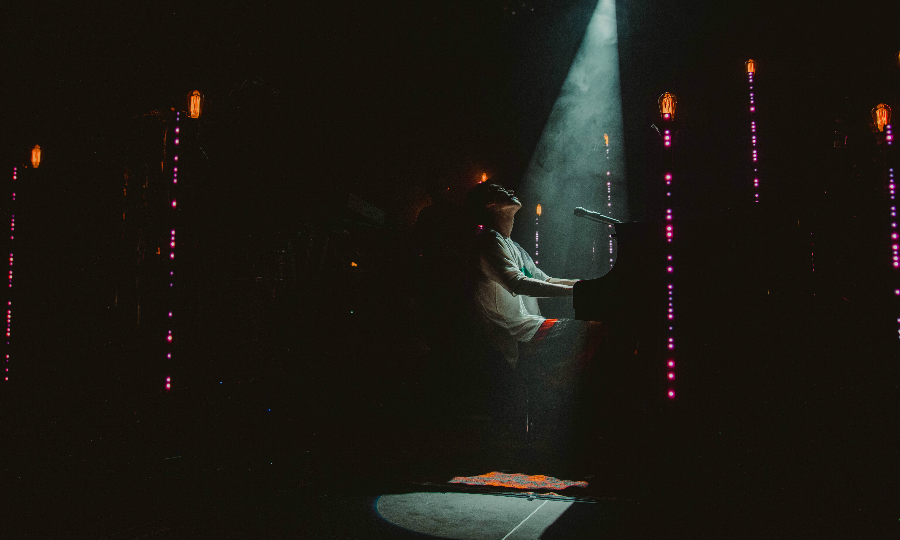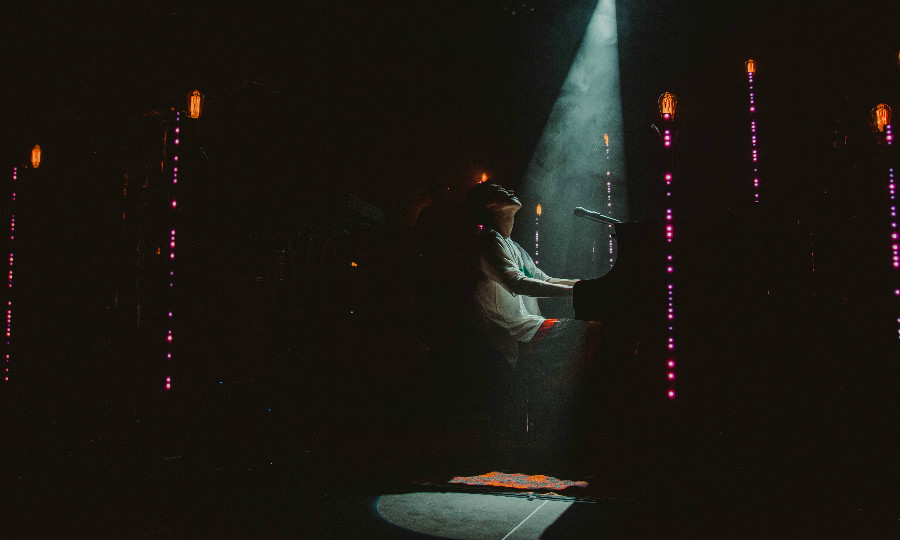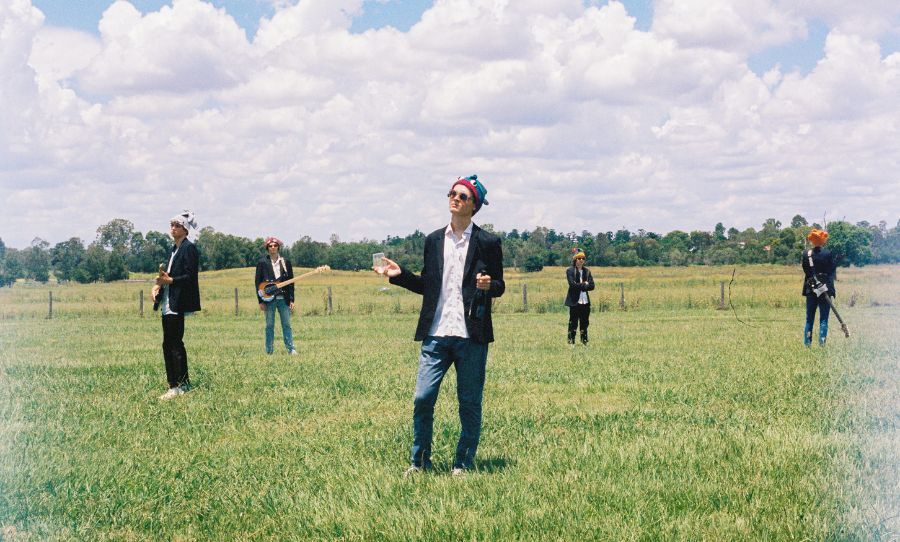No matter which way you look at it Jacob Collier is a genius. I mean, if you’re mentored by Herbie Hancock and Quincy Jones it’s king of inevitable. With a commanding, yet eerily unique, baritone voice Collier will have you hooked at first glance, and that’s before his fingers touch the keys.
The jazz protégé has stormed the world of late with a musical knowledge beyond professionalism and the flare of a mind immersed wholly in experimentation.
We recently caught up with the young extraordinaire after he hit Australian shores to chat about his monolithic quadruple album and the endless pursuit of knowledge.

“You have to be an artist who is willing to listen,” Jacob Collier peels back the layers of his incredible sound worlds and remarkable insights.
HAPPY: Welcome back to Australia. Are there any Aussie artists you’re really digging at the moment?
JACOB: The absolute greatest for me would have to be Hiatus Kaiyote. They are such a vibe and I think they were the first Australian band that I ever really heard. I just found out there was this whole scene popping around that part of the world that I was never really aware of, so I decided to do a bit more digging and see what I could find.
HAPPY: You’ve composed and recorded all your albums in one room. Indeed the same room you’ve lived in you’re entire life, how important is space when creating?
JACOB: Extremely important. I’ve always counted myself among the lucky to have a space in which to explore the musical language with complete freedom. If I was paying for studio time the vibe on the records would be slightly different I suppose. But I have always made music in my family home in London so for me it’s a matter of rolling out of bed and heading straight into the studio to record anytime I want, either day or night. When you’re young you try to make as many ideas as there are ears to hear the ideas and also space in which to create the ideas. So having a musical family and the freedom to create what I wanted, when I wanted I started to just accidentally make a career out of that.
HAPPY: While some of you’re songs may feel simple in essence, they are often wildly complex, with endless turn and layers swooping in and crafting theses vast sound worlds. Especially in songs like, With The Love In My Heart. How does composing a song like this come about?
JACOB: For me music itself is simple, it has to be simple, it’s always going to be simple. But you can add infinite layers of complexity to that. If you look at the world around us and human nature it’s kind of the same. There are a lot of things that are simple in essence but there are always these layers of complexity. I always try to imagine music the way that I listen to it, with all these different sounds and layers of sound, and nowadays you can layer so many different things on top of each other. Due to that room in London I’ve always ended up using a variety of instruments and strange things around the house like saucepan lids, or badminton racquets or trampolines and just tried to make them sound musical. With a song like With The Love In My Heart it’s more like four or five songs put into one, but it’s also an opus introduction to this crazy quadruple album thing that I’m currently doing. I’m doing four albums in a year. So that song is kind of an introduction to all of those musical spaces. So it’s about being as descriptive as possible in as little time as possible but it kind of takes you on a bit of a journey I suppose.
HAPPY: Do you ever wake up in the middle of the night and think, ‘Oh I’ve got to add this other layer’ so you run downstairs and start recording.
JACOB: Oh man of course. That is an extremely common feeling for me and I don’t know why it has to be the nighttime but it does. It’s weird… kind of frustrating sometimes.
HAPPY: With such a staggering list of instruments in your pool of talents are you always on a quest to find new instruments to learn and things to hit.
JACOB: Yeah always! For me it’s a matter of trying to finding sounds rather than finding instruments. I always treat instruments as sounds rather than instruments. But I wouldn’t necessarily say I’m a bass player or I’m a bass player of I’m a drummer, I try to make sounds out of those instruments when I can. Absolutely though I’m always on the lookout for new whacker instruments. I just found one recently called the ‘Harpejji’ and it’s crazy. It’s this 16 string, whole tone tuned hyrbid of a keyboard and a guitar; it’s really tickled my fancy lately.
HAPPY: Amazing! And I guess with that outlook you’re bound to find music anywhere you go and in everything you touch.
JACOB: Yea absolutely, I have collaborators from all around the world really. I have over 30 collaborators and many of them play instruments that I have never heard of, or never tried to play myself. It’s incredible to be embarking on this epic mission.
HAPPY: Where do you think the magic in music comes from?
JACOB: Well for me I think that music is essentially a language and I think humans have a tendency to make magic out of whatever language they use, in fact I think that’s one of the things that makes us human. For me, music allows me to step over borders and boundaries around the world, touching people, reaching people, and connecting people who wouldn’t otherwise connect I think is extraordinary. The moment being in a room either making music or participating within the music making magic from an audience perspective it’s really something that you can’t capture. You can’t capture it on social media and you can’t capture it on videos, but being in the room it’s one of those miraculous things. And nothing needs to be said really, it just needs to happen. Some of the greatest magic is where it can be left unsaid, yet the magic is in tact.
HAPPY: London seems to be at the forefront of a jazz revolution right now with artists like Yussef Dayes, Alfa Mist, Cosmo Pyke, and the list goes on really. Why is that? Is there some magic in the city?
JACOB: I think so but I’m not exactly certain if I can answer your question. It’s tricky. For me I have always had this baseline because it’s where I grew up and perhaps I took it for granted as a kid. But the spirit of everybody is welcome in a place, which now is obviously becoming increasingly contentious. But everybody being welcome in a place, allowed to create in a place and having a space to be creating in is something that I feel London is permeating with. It might be one of the reasons London has got things first historically. I remember Jimi Hendrix, well I didn’t because I wasn’t alive at that point. But Hendrix came to London in the 60s and he came from the States but London was the place that got him first and from there he became this musical mastermind. It’s a place that is open and willing to accept the weirdness of things and accept the strangeness, and often humour of things in a way that other parts of the world struggle with at first. But really the scene nowadays, being a musician, is becoming increasingly international. I’ve been travelling the world of the past three or four years touring and collaborating and it feels that people are starting to pick up on a wave that is no necessarily grounded in a place but on different psychologies worldwide. It’s more possible to be a musician who is willing to listen which I think is the most important part of creating and those journeys can take you anywhere you want these days.
HAPPY: People often look at you as a jazz piano prodigy, however, you’re music would appear to tell an entirely different story. How do you describe your music?
JACOB: Hmmm difficult question. I tend to describe my music as joyful, not particularly a genre, but I’m not really a big fan of genre. I feel like music can be expressive, joyful, and orchestral. It can be multi-layered, it can be descriptive, it can be honest and those things are what I aim for I suppose. But if someone is interested in jazz, or rock n roll or folk, or dub-step or gospel, it’s hard to necessarily pin it down. But I’m creating this mammoth 50 song quadruple called Djesse and all of the genres I have mentioned are present in this project. Rather than say I play this music or this instrument, I think it’s just about trying to be as descriptive and honest as possible. I create music that is based on sounds that I really enjoy and I think that’s the best thing I can do, chase down those styles and space which I have enjoyed my whole life and to see how far I can push the person.
HAPPY: Is there a focus or some sort of narrative with where Djesse is going with the next two volumes?
JACOB: Yeah absolutely, just to briefly put you in the picture. The first, second, third and fourth volumes of Djesse are all based around different styles. One and two have come out, and three and four are yet to come out. Volume one sounds like an orchestra. It’s not necessarily orchestral music traditionally speaking but the sound world certainly mimics an orchestra. The second volume is very much a smaller acoustic space focusing on folk and world music and a little bit of jazz as well as bosanova and African music. Volume three, when it comes out in a few months time, is absolutely bizarre. It’s very strange and odd. But it’s very groovy and by far the funkiest of all the albums. It’s immersed in sound rather than being based on style. But it’s electronic it’s digital it’s kind of broken beat meets hip-hop, R&B and soul. It’s the one I’m most excited about overall. Volume four is a combination of all these different genres and sound worlds that we have visited thus far. So I guess I’m just going to take all of those and implode them in some way and focus around the human voice which I think is the most important of all the instruments. So there are a lot of collaborators and pathways of songs but I guess, as someone with a love of so many genres I guess I just wanted to stretch my imagination and see how far they could go.
HAPPY: You have won some impressive awards over the years including 2 Grammy’s in 2017. How does that fell?
JACOB: Really weird actually, yeah, really strange. I can’t believe the whole Grammy thing because I just sat in this room in London and recorded something and now they’ve won Grammy’s. So in a way it’s bizarre but it’s also incredible that nowadays people can just succeed by doing what they want to do rather than what other people want them to do. That’s the most exciting thing is that I didn’t particularly compromise the musical language I just explored. When the nominations came through it felt like a joke, it was almost unbelievable, I never thought I was this prestigious musician who had created something worthy of Grammy’s, whatever that means nowadays. But yeah it’s crazy and very exciting to be recognised doing something that I feel strongly about, it feels like the greatest gift of all.
HAPPY: I love that brilliant video of you and Herbie Hancock wordlessly expressing harmony together, and letting your hands do the talking. Is there anything a master of jazz in that caliber still has to learn? Or is jazz a bottomless pit of sorts?
JACOB: It’s fun because I’ve known Herbie for a few years now and we jived around harmony, as harmony fans. I wouldn’t necessarily think of Herbie Hancock as a jazz musician and I certainly wouldn’t define myself as one. The interesting thing about jazz itself the language between rhythm, harmony and melody. It’s in some ways better to reference it in jazz terms as jazz has had some incredible languages of discussing and explaining harmony. But you can take that language into so many different places and Herbie Hancock talks about the idea that music comes from life and if you were to ask him that question he would always say that at the point in your life in which you decide to stop learning then your life just comes to an end. So in lieu of that philosophy it’s always a very important thing to focus on the creator that you are and to look that person in the eye when you are creating and be as honest and as descriptive as possible and as long as you do that the music will never end. So I think something that people need to focus on as a person and a musician is what stories do you want to tell? Herbie Hancock has had so many thrilling sound worlds and narratives over the course of his life and he’s still going, so for me to hang out with someone like that is endlessly inspiring.
HAPPY: That sounds amazing! It’s been a pleasure talking to you Jacob. I’d just like to ask what’s next for you and where your musical path is going to lead?
JACOB: I guess I’m not thinking that far ahead really. I’m pretty focused on this quadruple album thing so that’s as far forward as I go. But I guess for the moment I’m just really excited about touring. I toured the world for a while as this one man show and I was playing all the instruments myself and creating these loops, there were six different looping machines. I was running around like a madman. Now I’ve expanded that show into a four person band, me included, with this immense stage plan, and we all rotate between instruments and evolving a growing together all the time as we play songs from Djesse. But this whole thing is going to take me all over the place for the next few years I hope. So I’m thinking after this quadruple album is finished I’ll be putting a lot of my energy to making this thing feel as beautiful as possible.



